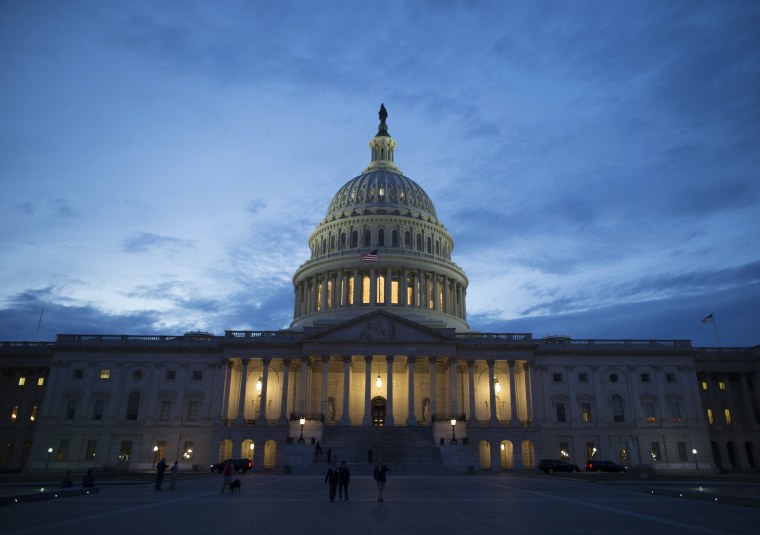Behind closed doors, some Democrats wrestled Tuesday with whether to attend President Trump's first joint address to Congress given the caucus' outspoken opposition to many of his policies.
Some members spoke in favor of attending the speech, saying it was an important show to their constituents that they were doing their job by attending, while still being willing to fight.
“The only thing we urged members to be is respectful," House Democratic Whip Steny Hoyer told reporters Tuesday ahead of Trump's address.
Others, such as Rep. Maxine Waters, D-California, said she will boycott the address because she couldn't "contain enthusiasm" against Trump. Waters, who also did not attend Trump's inauguration, encouraged members harboring similar sentiments to skip the speech as well.
Others plan on protesting the new president by inviting a diverse group of guests most directly affected by Trump's most controversial policies on such matters as immigration, gun control and healthcare.
Still others are opting not to save a prime aisle spot to shake the president's hand.
Rep. Elliot Engel, of New York, who is notorious for saving aisle seats before addresses such as these, told House members Tuesday afternoon he would not do so this year — the first time in his 29 years in Congress.
"This isn’t part of our normal political discourse — this goes beyond ideological and political differences," Engel said, citing concerns about a lack of bipartisan outreach from the Trump administration, including on investigations into Russian interference in the 2016 election. "The president needs to work with all people and therefore, I will listen to what he has to say today but I will not greet him and shake his hand."
The varied approaches to handling attendance at the high profile speech reflects the pressure from the Democratic base to withhold support from Trump, said Larry Sabato, a political scientist and professor at the University of Virginia's Center for Politics.
"The base will appreciate even symbolic anti-Trump actions tonight" he said.
But Democrats should only go so far in showing their opposition, Sabato said.
"There are two no-no's. Do not interrupt Trump's speech. Remember how legitimately upset Democrats were when a GOP Congressman yelled 'you lie' at President Obama," Sabato said. "Also, don't turn your backs or use rude gestures. This is an occasion of state, and even if Democrats deeply detest Trump, this is an opportunity to show they respect the office anyway."
Rep. Adam Schiff, D-California, said it would be an insult if any Democrat shouted something at Trump during the joint address tonight. However, the president could receive a tepid reception on policy proposals.
"I do think you're likely to see Democrats have very little to applaud for this president or what he proposes because frankly he's given us very little reason to applaud anything he has championed thus far," Schiff told MSNBC.
The White House has previewed the address as an optimistic look forward at the promises the president will follow through on during his time in office. White House Press Secretary Sean Spicer said the first part of the speech will focus on jobs, the economy, trade deficits, and a discussion of what the president will do to bring jobs back.
The last portion of the speech will be an attempt at making the case for unity, about working together and strike an optimistic tone.That expected tone is a stark departure from his Inauguration address, which painted a dark picture of America and was criticized by some for its bleak assessment of America.
"It is important to be there and to be able to listen to what this president says, like every other president, in order to react accordingly," Sen. Bob Casey, D-Pennsylvania, who will attend the speech said in an interview with MSNBC.


